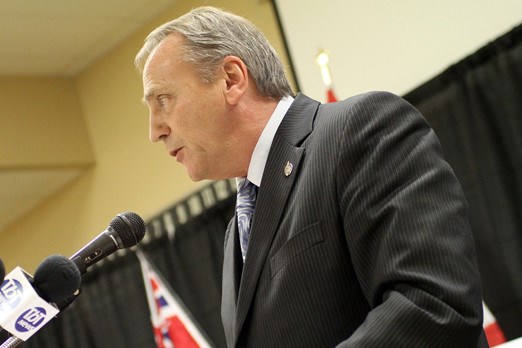Fort William First Nation will get $154 million and the deeds to the provincial portion of Pie Island and all of Flatland Island should the community ratify a decades-old land-claim settlement with the provincial and federal governments.
The tentative deal, expected to be voted on by Fort William First Nation members in late January, dates back to 1853.
Ottawa is giving the bulk of the money – and its largest agreed-to settlement yet – $149 million, while the province is kicking in 4,655 hectares of land and $5 million. As part of the deal Fort William First Nation will relinquish claims to Mission and McKellar islands.
Collins said the deal, if ratified, will bring to close the single biggest issue facing the reserve, and set in place a solid foundation for the band’s future, which includes a working partnership with the City of Thunder Bay.
Fort William First Nation Chief Peter Collins, who said if a deal hadn’t been reached the reserve planned to levy and collect taxes on the disputed territory, called it a good day for his people.
“I think as we move forward this will bring our community forward into prosperity, economic opportunities. It will give us strength and instill educational values to our members and hopefully this goes a long way in creating a positive future for our members,” Collins said.
The chief, who publicly announced he plans to not seek re-election next April, said some of the money will be distributed to the band’s 1,800 members, while the rest will be used to improve housing, pay for education and other economic development opportunities.
Collins called it a fair trade-off for the way his people had been forced off prime farmland, the loss of mineral rights and sent to live on swampland and rocky terrain.
“This is a starting point as we go forward. We will create a good journey, a good future for our members,” Collins said.
The claim, which dates back to the Robinson Superior Treaty of 1850, was re-opened in the mid-1980s, brought to the attention of both the province and the nation. Following an extensive review, the claim was accepted by Ottawa in 1994 and Ontario six years later, when formal negotiations began.
Conservative federal Minister of Indian Affairs John Duncan said the deal brings a greater fairness to the people of Fort William First Nation.
It’s one of 350 land claims across the country they’ve addressed over the past three years and Duncan expressed confidence that it will be ratified once taken to the community for approval.
“It’s an important one and it settles a long-standing agreement and I think demonstrates the government’s agreement involving these outstanding claims.”
Duncan said the complexity of negotiations is the main reason it took more than a decade to come to a resolution both sides could live with. He also laid blame on the system, stating the system was not well-designed but its flaws have been fixed, which should lead to more settlements in the near future.
Duncan said it’s win-win for everyone.
“I think it’s a fair deal for all sides. I’m pleased that the province is collaborating as well. I really appreciated the chief’s comments today, because he’s putting the focus on education and economic development and what that will do for social development in the community,” Duncan said.
Northern Development, Mines and Forestry Minister Michael Gravelle said the deal signifies the hope and potential that occurs when three governments work together.
“It’s a wonderful opportunity for Fort William First Nation in terms of the compensation and the land, in terms of economic development opportunities and a true partnership with Thunder Bay and the region that will accrue from this boundary land-claim settlement,” Gravelle said.
Sign in or register
- Messages
- Post a Listing
- Your Listings
- Your Profile
- Your Subscriptions
- Your Likes
- Your Business
- Support Local News
- Payment History
Registered Users
Already have an account?
New Users
Create a free account.
